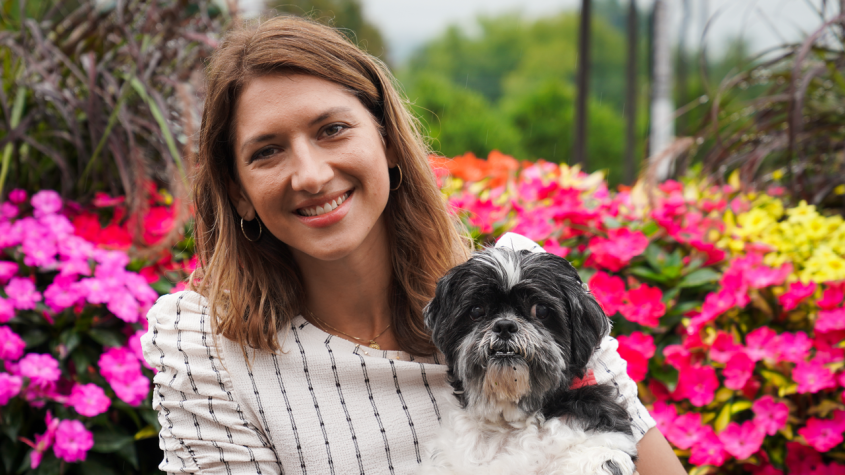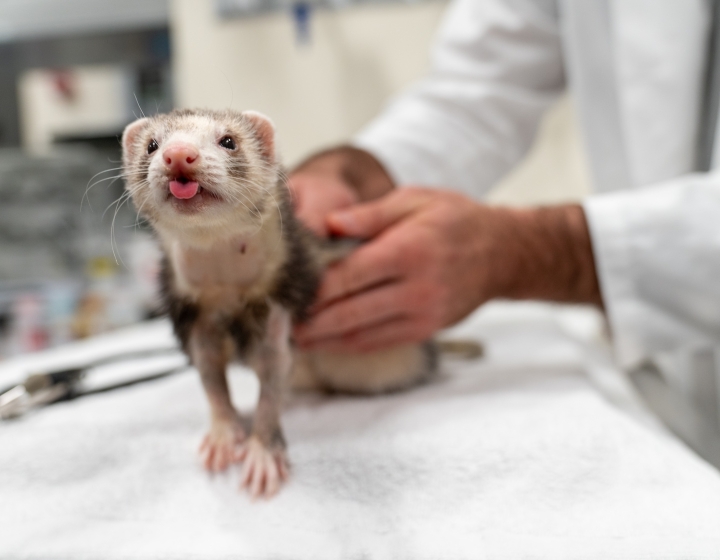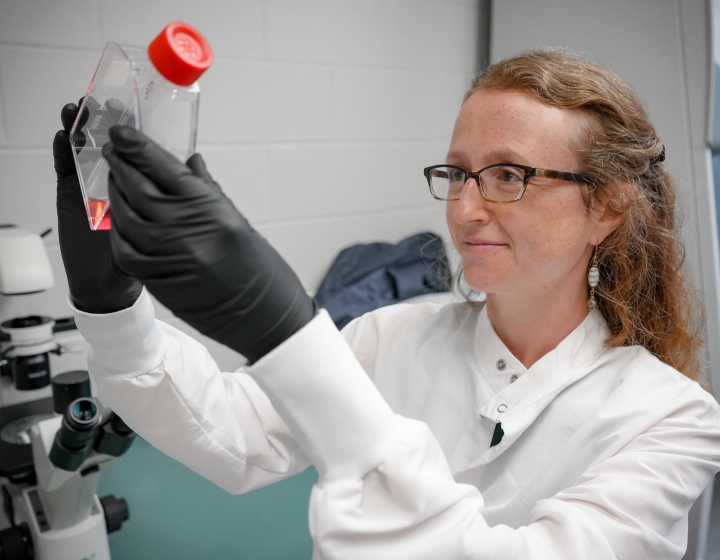Veterinary social work advances comprehensive approach to care
The Cornell University Hospital for Animals (CUHA) has recently welcomed a veterinary social worker to the team. Stephanie Coco joined the hospital this summer, and sheds more light on her role at CUHA as well as the profession in the following Q&A.
Q: What does a veterinary social worker do?
The role of a veterinary social worker (VSW) is to tend to the human needs that arise within the field of veterinary medicine. While the animal’s physical health needs are being addressed, there are psychosocial needs of pet owners and the veterinary medical team which a social worker can support. The VSW honors the human-animal bond by communicating with and supporting pet owners on matters related to serious illness, quality of life, decision-making, goals of care, euthanasia, grief and bereavement.
The support that the VSW provides to clients creates a ripple effect that helps the veterinary medical team feel more supported through difficult cases. Without a VSW, the medical team often takes on the emotional needs of the client, as well as addressing the physical needs of their pet. The VSW is trained in tending to the emotional needs of those facing stress or in crisis. This allows the medical team to focus their energy primarily on the veterinary care. It is truly a comprehensive approach to care.
A VSW also has a role in supporting those who work within the hospital. They can assist with managing work-related or personal stress, reducing compassion fatigue and by referring individuals to human resources, mental health care professionals or advise on other appropriate next steps. They also can provide educational presentations, attend staff meetings and rounds, and provide group and individual debriefing.
Q: What does your day typically look like?
As a 24/7 hospital with emergency services, acute needs can arise at any moment! I am involved with emergency and specialty services and serve all parts of the hospital, including the Small Animal Community Practice, wildlife teams and the ambulatory service. I spend a lot of time on my feet throughout the day, checking in with different specialties to see if there are any social work needs within their team or for their clients. Some of the cases I am involved in are preplanned, such as joining a veterinarian in a scheduled appointment to assess the overall coping of the pet owner or facilitating a quality-of-life conversation. Other cases are less predictable, and I often receive messages from team members that there is a client in the hospital with a sudden need for VSW support. I make every effort to tend to both expected and unexpected needs that may arise. In summary, my workday can vary a lot depending on the needs of the clients and staff of the hospital.
My position has parts that are also non-client facing. I attend rounds and meetings with different specialties to stay abreast of their needs, the challenges they are encountering and to discuss cases that may benefit from VSW involvement. I am part of several work groups related to the overall well-being and function of different parts of the hospital and its people. I collaborate regularly with CVM's well-being program director Kate Buckley on education and resources that can benefit people within both the College of Veterinary Medicine (CVM) and CUHA. CVM is in the process of hiring an embedded therapist, whom I look forward to collaborating with, to continue to grow our efforts on mental health and wellness of those in the veterinary field.
Q: What do you hope to accomplish in your role at Cornell?
As the first VSW here, I plan to lay the foundation for a department that can grow to include several social workers. Our hospital is large, and there is a lot of potential for growth! We have the potential to expand to have additional VSWs on staff and master of social work interns seeking to gain experience in this field. I can also provide training to those who work at CUHA to help them learn and refine skills related to empathy, self-care, communication and other social work topics.
My overarching goal is to support the overall wellness of anyone who interacts with the hospital. I am in a unique position where I can support and advocate for the animals we serve, their families and the veterinary medical care team. The wellness of one of these pieces is interdependent on the others and the opportunity to support all of them is an honor.
I am currently updating our pet loss resources and establishing regular bereavement services for clients who have lost a pet. A bit further down the road, we hope to implement an in-person pet loss support group here at Cornell. There are many virtual options for pet loss support, which is wonderful, but nothing beats the personal human connection of being in the same room as others rather than through a screen.
The hospital is in the finishing stages of building a comfort room, a calming, private space to interact with clients. Having this dedicated tranquil space is part of our ongoing effort to tend to the emotional needs of our patients and their families. It gives me a place to meet with families to process the emotional journey of their pet's illness and provide support and resources related to euthanasia and pet loss.
There are many exciting ideas and projects for staff and clients alike on the horizon. I hope you’ll stay tuned to see what we have in store!
Q: How does this work affect the veterinary field as a whole?

Many individuals go into veterinary medicine planning to spend their entire career in this field. Unfortunately, many working in this field experience burnout and compassion fatigue. Having VSWs embedded in hospitals and practices proactively addresses those issues. It also breaks down barriers to accessing necessary resources and services for folks in this field, having someone right at their workplace who can support them with acute needs and/or refer them to other resources and services when more specific or long-term assistance is requested. The VSW can also advocate for changes within a workplace to better tend to the needs of the staff.
There is great potential to better support the hard-working staff in this vital field. Large hospitals like CUHA are paving the way by showing that this is a service worth investing in. I predict the veterinary social work field will continue to grow, and hope that eventually having a social worker on staff would be a normal within most veterinary hospitals.
Q: Anything else you’d like to share?
I’m excited to be part of a field that is evolving, investing in mental health and wellness and values the presence of a social worker on their team. My professional background is in human medicine, where social work is embedded in the care team in nearly all settings, from hospitals to outpatient care to nursing homes. I would love to see this model within veterinary medicine, and feel hopeful that we are headed in that direction!





